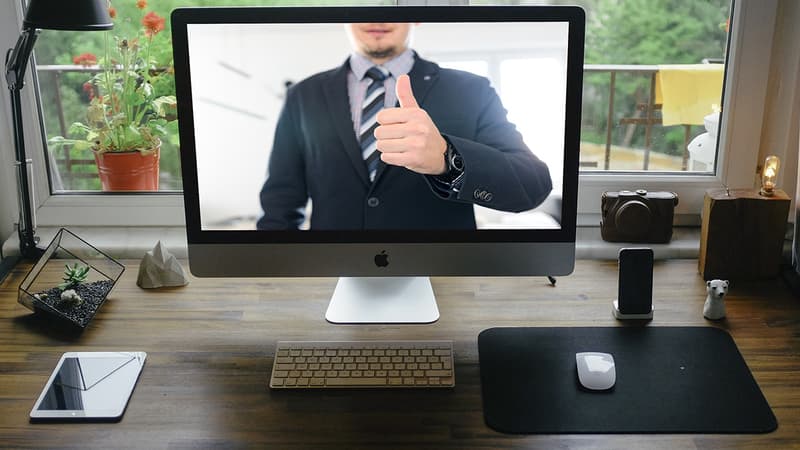Teleworking has become a reality for many employees, it has been installed permanently since the covid health crisis. If it allows you to better balance your professional life with your private life, teleworking also has its downside: employee monitoring.
In fact, it was necessary to adapt the practices of managers to control the activity and/or productivity of these employees away from the offices.
And the catalog of tools that are made available to management is very broad: from the most classic ones such as the use of software to track email, Internet browsing or collaboration tools. To the most intrusive, such as video surveillance systems, web cameras equipped with gaze tracking technologies or even keystroke recording software.
According to a recent study by Resume Builder, 96% of American companies (out of 1000 respondents) they say they have established means of remote monitoring.
In the US: care tracking tools and remote screenshots
Most used method? Tracking navigation on certain sites but also and above all attention tracking software whose principle is to make an object appear on the screen that you have to click quickly, under penalty of being considered inactive… 45 % of US companies surveyed say they have implemented this rather creepy device.
44% have opted for a random screenshot system to find out what the employee is really doing in front of their computer. It must be said that few rules govern this practice on the other side of the Atlantic, which makes it possible to go quite far in monitoring.
Methods fortunately prohibited in France. If the remote monitoring of employees is authorized in France (from the moment the employee is informed and his fundamental rights are respected), certain tools cannot be used.
Specifically, according to the Labor Code, “any surveillance measure must be justified by a legitimate reason, proportionate to the objective pursued, transparent and made known to the workers in advance”. The devices must also be declared by the company to the Commission Nationale Informatique et Libertés.
Strict framework in France
Webcam video surveillance, continuous computer screen sharing, use of keyloggers (logging keystrokes), and recording of phone calls are strictly prohibited.
This does not prevent French companies from using remote control as well, but it seems less widespread than in the United States, where the practice is poorly regulated.
According to a Software Advice study*, 46% of surveyed employees said their employer uses a dedicated tool, 12% could not answer. In most cases (62%), the monitored employees state that they have been informed by their bosses or by the HR department, but 31% had no information in this regard.
According to the study, tracking login and logout times, as well as active and inactive periods is the most used tool (28% of respondents) linked to workload management (tracking of task lists , calendar and performance indicators).
Reinsurance
Faced with this practice, the feeling of employees is ambivalent. A source of stress for some, it presents several interests for others.
Therefore, 69% of respondents say they are comfortable with controlling workload management and 66% with controlling logon and logoff times. By contrast, only 42% of those surveyed consider it acceptable to monitor the workplace with a webcam, a practice that is prohibited in France.
And for some employees, remote monitoring allows a kind of peace of mind from their employer. 36% of respondents who are comfortable with the practice believe it “makes it easier for managers and employers to take hours worked or overtime into account.”
It would also allow companies to have proof of work from employees (28%) and provide better visibility into employee productivity and performance (28%). 26% think it helps catch bugs before they get worse.
However, the perverse effects of surveillance are pointed out by more employees. “48% of the employees surveyed affirm unequivocally that knowing that they are being observed damages or would damage their morale, stress and 31% fear a negative impact on their morale”, we can read.
40% feel that it is an invasion of their privacy, 26% that it is unethical, and 19% feel pressured to work harder.
Morale at half mast, resign
“It is evident that this feeling of distrust could harm the good working environment within the company, and therefore the performance of the workers. It is therefore up to employers to take all measures of transparency and respect for private life in order to reassure employees. ” We can read.
Overall, given the choice, 55% of surveyed employees would no longer want to be monitored, while 30% would find no problem.
And many employees draw conclusions from this, given the balance of power in their favor in the job market. According to a study by Vanson Bourne for VMware (in 2021), 48% to 45% of French companies currently using surveillance systems have a “higher” or “significantly higher” turnover rate.
“By lacking transparency and measuring their productivity haphazardly and solely using numbers, employers can quickly undermine the trust of their employees, and risk seeing their best talent leave, while in an extremely complex and competitive environment,” warns the study.
*: Survey carried out online between January and February 2023 that gathered the participation of 896 professionals, including 557 employees (in training, juniors or intermediate) and 339 managers (intermediate or senior). The selection criteria for the participants were the following: residing in France, being over 18 years of age, working in a company of 2 to 250 people, working full or part-time. The number of respondents varies from question to question based on their answers to previous questions.
Source: BFM TV


